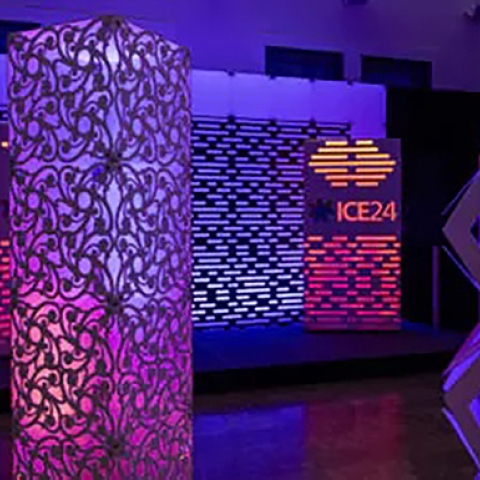Corporate Events Benchmarking Report Reveals Planner Challenges and Priorities

Corporate event planners are struggling to implement sustainable practices and next-gen technology while maintaining traditional event planning priorities, according to the latest ICERESEARCH Annual Benchmarking Report, which details the greatest challenges and emerging trends currently impacting event planning within the corporate event sector in the UK, North America, and Europe.
Developed by the In-house Corporate Event (ICE) community of corporate event planners in partnership with Cvent, the 2024 benchmarking report is based on survey responses from planners across the three regions and is designed to provide in-house planners with data-driven insights and in-depth analysis on team structures, salary benchmarks, and cutting-edge technology adoption.
Here are some key takeaways from the report:
Sustainability Struggles
Despite the increasing industry-wide push for environmentally conscious event practices, many corporate planners are struggling to implement sustainability into their planning processes, with sustainability taking a back seat to priorities such as cost management, attendee satisfaction, ROI, and technology integration.
While more than 57% of respondents acknowledge the need for enhanced sustainability education, 45% said they prioritize cost management when planning events. This gap between awareness and action stems from immediate demands overshadowing long-term sustainability goals, with the majority of respondents citing cost as the biggest barrier to adopting sustainable practices, even as many larger organizations become more environmentally conscious and push for net-zero targets.
Attendee Satisfaction
For 63% of respondents, attendee satisfaction ranks among their top three priorities, with event success largely measured by attendee experiences, including content quality and networking opportunities.
When measuring the success of their events, the 93% of those surveyed used attendee satisfaction as a key metric, followed by post-event surveys (76%), tracking attendance numbers (more than 71%), lead generation (more than 58%), and content performance (52%).
Managing Costs and Achieving ROI
Cost control is top-of-mind for 75% of planners, who are grappling with rising expenses that stress budgets. Alongside cost management, 60% of survey respondents indicated an intense focus on ROI, which encompasses financial returns and stakeholder value, such as lead generation and overall satisfaction, and cited it as a comprehensive indicator of event success.
Technology Integration and Adoption
Interest in leveraging next-gen technology such as artificial intelligence (AI) to enhance planning efficiency is on the rise, however, only 35% of respondents are currently using it in their event planning processes.
While the industry continues to face challenges in integrating advanced technology into day-to-day event execution, 41% of planners are already using AI to improve and streamline various aspects of event management, including content generation (more than 83% of respondents), logistics and planning (32%), data analysis (just under 30%), and personalizing attendee experiences (more than 21%).
In addition to AI, planners are increasingly relying on various event technologies, including event registration platforms (more than 90% of respondents), hybrid event solutions (more than 74%), and web-streaming (more than 72%), matchmaking (more than 18%), and augmented reality (more than 16%).
Future Trends
Hybrid events that blend in-person and virtual elements are recognized as a significant trend by 52% of respondents for their flexibility and potential to reduce travel. The integration of AI and data analysis is emerging as a key trend for enhancing personalization and minimizing waste, though only 10% are using AI to track carbon footprints. While AI and data analysis present opportunities for streamlining events and enhancing experiences, broader adoption remains a challenge across both strategic and logistical aspects of planning events.
Planner Challenges and Priorities
Stakeholder management and technology integration are currently significant obstacles for event planners, according to the report. Half of the planners surveyed anticipate their team sizes will remain unchanged over the next year despite increasing event complexities. This situation highlights the pressure planners are under to deliver high-quality and innovative experiences with limited resources.
Context: Headquartered in the UK, ICE is a network of more than 1,000 corporate event planners who work within organizations to manage and execute their internal and external events. Focused on sharing best practices, insights, and resources among members to enhance the effectiveness and impact of corporate events, the ICE community provides a platform for in-house planners to connect, collaborate, and learn from one another via ICE conferences, webinars, thinktanks, Zoom gatherings, online publications, benchmark research, training, and other communication channels.
Don’t miss any event-related news: Sign up for our weekly e-newsletter HERE, listen to our latest podcast HERE and engage with us on LinkedIn!


Add new comment